Nautilus’ Freedom of Information Act – Global Disclosure Project examines and publishes information on government policy and doctrine in the United States and other countries. The project aspires to increase government accountability and inform the public on high-level government planning, particularly on issues of Nuclear policy. Our FOIA reports develop the existing discourse on current affairs by giving our readers a historical view of international problems that continue to plague us today, as well as provide a valuable source of information on the way that these problems have been and are viewed by the US government. The project approaches policy analysis from a multilateral perspective with coordinated use of multinational Freedom of Information Act Requests and freedom of information use. This project creates public information with synchronized multi-national filings of freedom of information requests on governments for release of specific information. It “pools” the released information to maximize transparency beyond what is possible with purely national disclosures, and jointly analyzes and disseminates the information widely to provide unrestricted global public access to declassified documents and analysis. This approach differs from — yet supplements – policy research based on existing FOIA projects that promote FOIA laws in many countries and nurture their use in a national context.
Amongst Nautilus’ most effective and influential use of FOIA to date has been our work around the document Tactical Nuclear Weapons in Southeast Asia. Visit our Essentially Annihilated page to read about the report and the impact its release has had.
Use the below search options or the right-hand sidebar menu to comb through our library of hundreds of released reports.
To see all of our reports, leave the fields below blank and hit ‘submit’.
| Document |
Author/Editor |
Classification |
Tags |
File |
| Table of Contents for History of the 51st Fighter Wing |
|
|
|
|
| Table of Contents for History of the 51st Fighter Wing |
|
|
|
|
| Table of Contents for History of the Seventh Air Force |
|
|
|
|
| Table of Contents for unknown |
|
|
|
|
| Tactical Considerations for the Defensive Employment of Light Infantry in Korea |
Edward E. Thurman |
|
|
|
| Tactical Employment of Atomic Weapons |
L. H. Rumbaugh, J. B. Green, S. H. Turkel, H.W. Brackney |
Unclassified |
atomic weapon, China, defector, Korean War |
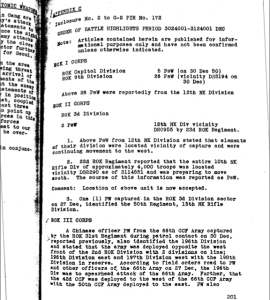 Download
Download
|
| Tactical Nuclear Technology in the MBFR Context |
McMillan Science Associates |
Unclassified |
|
|
| Tactical Nuclear Weapons in Southeast Asia |
FJ Dyson, R. Gomer, S. Weinberg, S.C. Wright |
|
he wuqi, nuclear weapon, nuclear weapons, Southeast Asia |
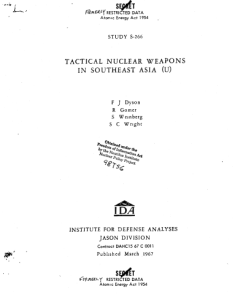 Download
Download
|
| Tactical Nuclear Weapons Responsibility: Ordnance Versus Field Artillery |
Lieutenant Colonel A. Fields |
Unclassified |
1990, 59th Ordnance Brigade, artillery, custodial unit |
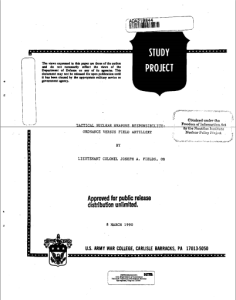 Download
Download
|
| Targeting the Soviet Army Along the Sino-Soviet Border |
Joseph V. Braddock, Douglas N. Beatty, William P. Schneider, Raymond J. Milesfsky |
Unclassified |
China, Deterrence, Fixed and moving targets, Kwantung Army Intelligence |
 Download
Download
|
| Technical Evaluation Program Autovon Evaluation Report |
|
|
|
|
| Technical Evaluation Program Autovon Evaluation Report |
|
|
|
|
| Technical Evaluation Program Report Narrowband high Frequency |
William J. Kowalczyk |
|
|
 Download
Download
|
| Technological Aspects of Indian and Japanese Nuclear Proliferation |
W. L. Daugherty |
|
|
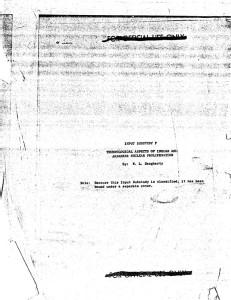 Download
Download
|
| Telegram from Tokyo to Secretary of State |
|
|
|
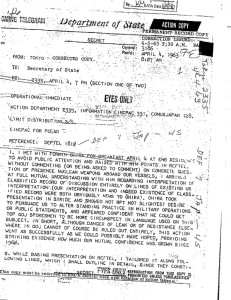 Download
Download
|
| Telephone Directory United Nations Command ROK/US Combined Forces Command and United States Forces Korea |
|
|
|
|
| Telephone Directory United Nations Command ROK/US Combined Forces Command and United States Forces Korea |
1st Signal Brigade |
|
intelligence gathering, operations security, OPSEC, Republic of Korea (ROK) |
 Download
Download
|
| Temporary Custodian Receipt (for maneuvers) |
James W. Twitty |
|
|
|
| Tension Reduction Measures in the Pacific |
|
|
|
|
| Terms of Reference for the Commander in Chief, US Pacific Command Representative, Australia |
|
|
|
|


 Download
Download
 Download
Download
 Download
Download
 Download
Download
 Download
Download
 Download
Download
 Download
Download
 Download
Download